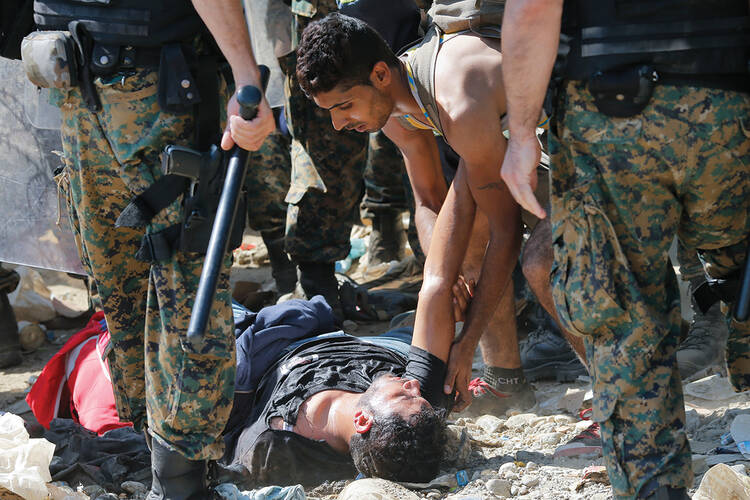What has been described as the worst refugee crisis since the end of World War II reached a crescendo in early September as thousands of people fleeing Syria, Iraq and other Middle Eastern calamity zones piled up against hastily erected barricades on the outskirts of Europe. But European sentiment, which had been resisting the idea of accepting large numbers of Middle Eastern asylum seekers, shifted abruptly with the publication of desolate images of a drowning victim, 3-year-old Aylan Kurdi, lying face down in the surf on a beach in Bodrum, Turkey.
Not far from his lifeless body were the bodies of his brother and mother and nine other victims of a disastrous attempt on Sept. 2 to reach sanctuary on the Greek island of Kos. Pictures of little Aylan ignited a world-wide examination of conscience that by the end of the day led to the apparent reversal of positions on refugee resettlement among European Union leaders, including British Prime Minister David Cameron. The United Kingdom has so far accepted only a little over 200 Syrian refugees, but Cameron told reporters Great Britain would fulfill its “moral responsibilities to refugees” and now accept thousands more.
The International Organization for Migration reports that more than 350,000 people have crossed Mediterranean so far this year, substantially more than the 219,000 estimated for all of 2014. The number of migrant people lost at sea this year is far outpacing the 2,081 who had died by this point in 2014, with 2,664 deaths so far.
Dino Mujanovic, country representative for Catholic Relief Services in Serbia, told America that C.R.S. has for weeks been responding to the crisis. “At this moment there is a huge humanitarian failure in treating the refugee crisis,” he said. “Those numbers are increasing day by day; people are coming, desperate, exhausted, robbed on the way, seeking shelter in Western Europe.”
Cut off because of their undocumented status from normal modes of transportation, many have crossed the continent almost entirely on foot, Mujanovic said. He estimates that most refugees—his preferred term, in light of the circumstances of their flight—are coming from Syria, but many are emerging out of Iraq also. “These are not economic migrants,” he stressed, noting the “strong” reasons many have to leave conflict zones in Syria and Iraq, escaping ISIS, the Assad regime or both.
“They need help, they need shelter, they need respite and they need to return and repossess their dignity.
“We should all show the solidarity and act with compassion with and for these people,” he said. “I am afraid, what the winter will bring and hope this will be handled properly. I mean that the influx will be at least decreased, if not stopped, and that refugees will be sheltered adequately and in countries where they want to be. We do not want camps, and we want them treated with respect and dignity—that is our human responsibility, as well as the legal obligation.”
C.R.S. officials report that the agency is scaling up its response to the crisis in the Balkans, working with its church partners in Greece, Albania, Macedonia and Serbia to provide immediate assistance, including food, water, access to sanitation, medical care and legal services. C.R.S. officials called on the United States to expand humanitarian assistance to countries in the Middle East and Turkey that have for years been sheltering the largest number of Syrians and Iraqis, as well as to countries burdened by this new migration. Most important, C.R.S. officials say the United States should lead concerted diplomatic efforts to end the fighting in Syria.
European leaders plan to meet in mid-September to hash out a response to the crisis, and Mujanovic said he is hopeful that will mean a comprehensive plan based on a shared commitment. Given the huge human press he is witnessing, Mujanovic was not encouraged by the small numbers some European leaders have said they are willing to accept for resettlement. He is hoping that more realistic figures will emerge during the summit discussion.
“The stories I have heard are horrible,” said Mujanovic, remembering one woman refugee who clung to one surviving child in a camp being served by C.R.S. She had been traveling with her husband and twins “who lost their lives between Turkey and the island of Kos.” The woman simply pressed on alone into Europe with the remnant of her family, too afraid to remain behind even just long enough to bury her dead.








